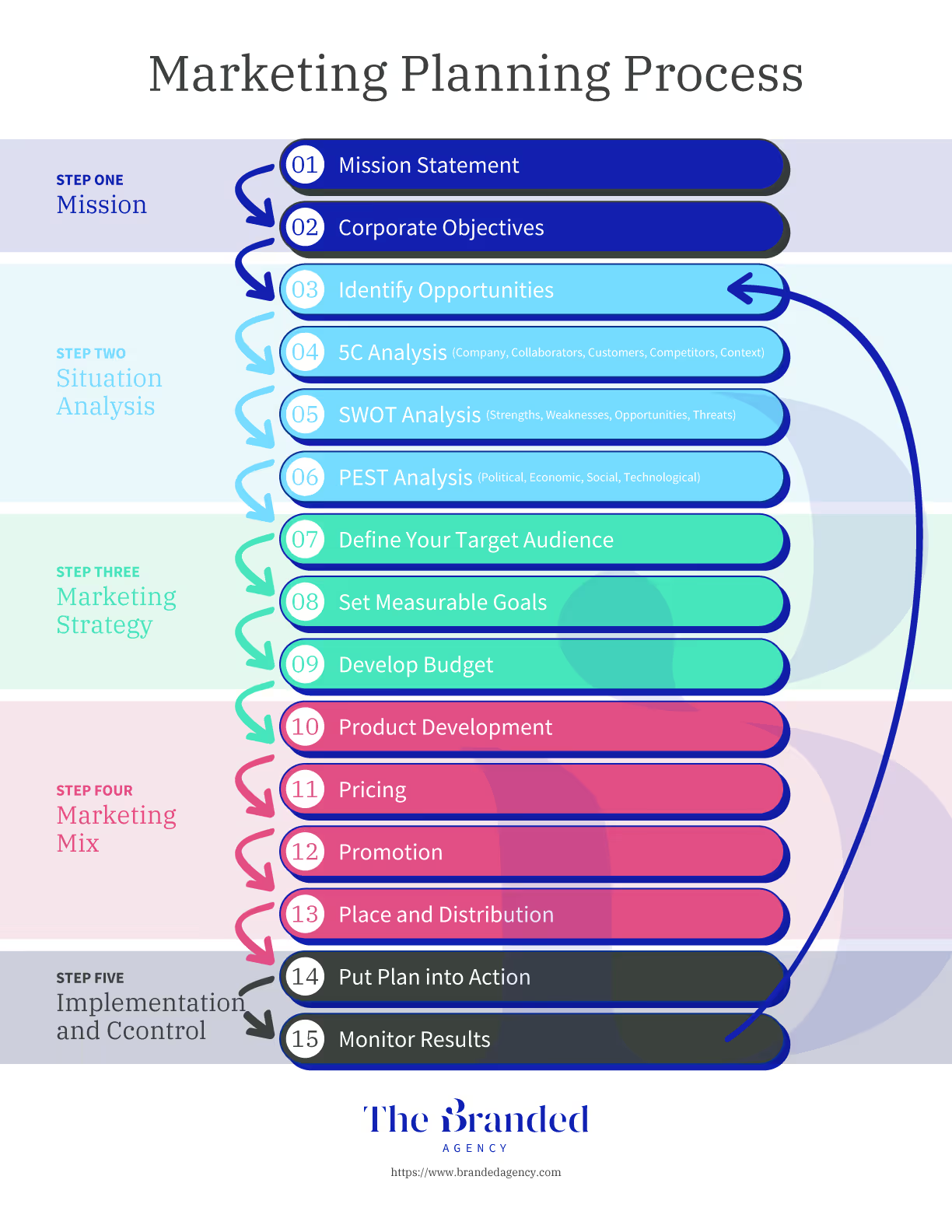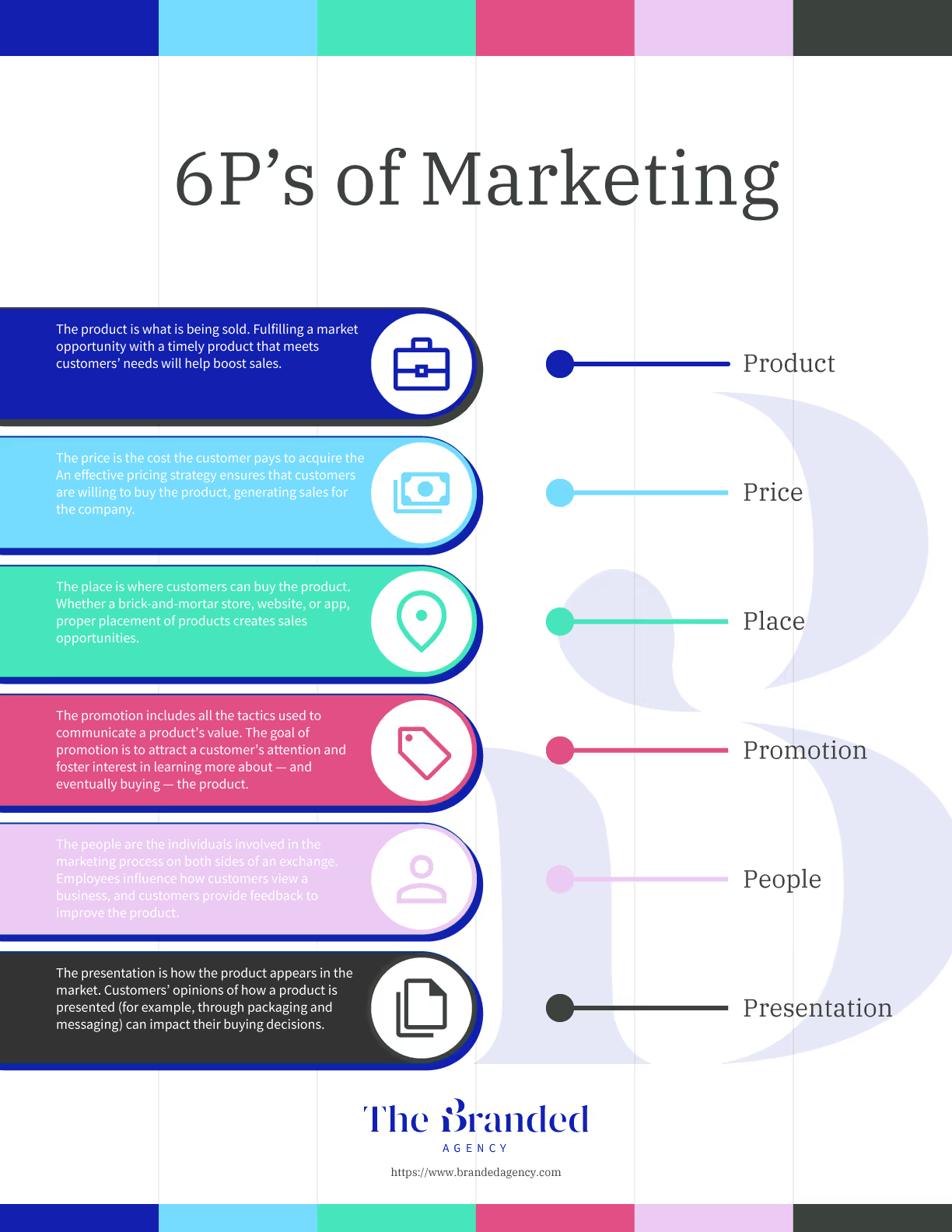A Guide to Writing a Marketing Plan
04/02/2025
Marketing Strategy
Every successful marketing effort starts with a solid plan—this guide walks you through building one that drives results.

If you're looking to improve your marketing strategy, one of the best things you can do is write a detailed marketing plan. A marketing plan can help you better understand internal and external factors that may impact your business, as well as allow you to conduct research on your customers, competitors, and market trends. Essentially, a marketing plan is a straightforward document that delineates your marketing aspirations and aims, along with the tactics you plan to employ to realize those objectives. Crafting an effective marketing plan necessitates a comprehensive evaluation of your venture, encompassing everything from your intended audience and rivals to prevailing market dynamics and sector-specific regulations.
.png)


A Comprehensive Guide to Writing a Marketing Plan for Small Businesses




Here are some quick tips to get you started:
Do Your Research
The first step in writing a marketing plan is conducting thorough research on your target audience, competitors, and industry trends.
This will help you better understand the needs of your target customers and develop strategies tailored to their needs.
Set SMART Goals
Once you have a better understanding of your market, it's time to set SMART goals.
A SMART goal is Specific, Measurable, Achievable, Relevant and Time-Bound. Make sure each goal is clear and achievable so you can track your progress over time.
Identify Your Strategies
Once you have your goals, it's time to figure out how to achieve them.
Think about the strategies you'll use—will you invest in paid advertising, publish content on social media, or start a referral program?
Staying aware of industry trends and regulations will help ensure your strategies are effective and compliant with the law.
Monitor Your Progress
Your marketing plan should also include a section on how you'll measure your progress.
This will help you track whether your efforts are paying off and make adjustments to your strategies if needed.
Writing a marketing plan isn't easy, but it's well worth the effort in the long run.
With a detailed plan in place, you can be confident that your marketing efforts are on track and helping grow your business.
In this guide, we'll walk you through the key steps involved in creating a comprehensive marketing plan for your business.
If you don’t have the time, knowledge or expertise to write your own marketing plan you can hire us here at The Branded Agency to do it for you.

What's the difference between a marketing plan and a business plan?
At first glance, a marketing plan and a business plan may seem very similar. After all, both plans are important tools for any business looking to be successful.
However, there is actually a key difference between these two types of plans: while a marketing plan focuses on the promotion of specific products or services, a business plan focuses on the overall operations of the company.
In a marketing plan, you will typically include information about pricing, distribution channels, and how you will get customers to buy your products or services.
This might involve strategies such as creating compelling advertising campaigns, building strong relationships with key partners and influencers, utilizing social media effectively, or offering discounts or promotions to attract new customers.
In contrast, a business plan typically includes information about the overall strategy and operations of your company.
It might include details about how you will manage finances and cash flows, create systems and processes to improve efficiency, or attract and retain talented employees.
At the end of the day, both marketing plans and business plans are essential for any successful business.
Whether you are just starting out or looking to grow and expand, having a clear understanding of your company's goals and strategies will help you achieve success.
Marketing Strategy by Definition












A marketing strategy is a long-term plan for achieving your business goals.
It should include information on how you will reach your target audience, promote and distribute products or services, measure success, and adjust strategies if needed.
Your marketing strategy should also take into account industry trends, customer needs, and any relevant legal or regulatory requirements.
By carefully crafting a detailed and well-rounded marketing strategy, you can ensure that your business is positioned for success.
Now that you know more about the importance of having a solid marketing plan, let's take a look at some of the key elements you need to consider when creating it.
Remember: each element of your plan should be tailored to the specific needs of your business.
Your marketing strategy should reflect your company’s goals and objectives, and provide you with a roadmap for achieving them.
Set your SMART Marketing Goals
The first step in writing a marketing plan is to set your S.M.A.R.T. goals. This means they are specific, measurable, attainable, relevant, and time-based.
Specific: Marketing goals must be clear and focused so that you know what your end result will be. Rather than saying "increase sales" or "attract more customers," try something like "increase the average monthly number of orders by 10% within six months."
Measurable: You need to be able to measure how close you are coming to reaching your goal by setting benchmarks along the way — for example, if your goal is an increase in sales, you might want to track the number of visitors per day who come from search engines or social media outlets, then compare it with previous months' figures so that you can see whether there's been any change (and if so, by how much).
Attainable: Make sure that the goal you set isn't too high or too low; if it's too high, it will be harder for you to achieve, and if it's too low, then it won't be motivating enough success. A good way of doing this is by looking at the goal and thinking about whether it would be possible to achieve it within a specific period (for example, if you want to increase your sales by 20% in six months, that's an attainable goal).
Relevant: Make sure that the goal you set is relevant to your business. For example, if you're a bakery and want to increase sales, it's not going to help you much if you set a goal of getting more followers on Instagram; however, if you're an online retail store, then increasing your social media presence might be a more appropriate strategy.
Timely: Set a date when you want to achieve your goal; this will help you stay focused on what needs doing and give you a sense of urgency about it.
Defining your target market
To create a successful marketing plan, you need to know who your target audience is. This will help you to identify the best ways to reach them and the most appropriate tactics for your brand.
If you are unsure who your target audience is, then here are some things you can do:
Make a list of all the people that might be interested in what you offer.
For example, if you run an online shop selling women's clothing, your target market could include all women aged between 18-35 years old.
Include as many demographics as possible in this list so that it includes as many people as possible who would be interested in what you have to offer.
Look at where your customers spend their time online and see which websites they visit or social media platforms they use most often. This will help you to identify the places where these people spend their time online and how they interact with brands on those platforms.
Research competitors in your industry and look at what other companies are doing with their marketing strategies so that you can see what works well for them and why.
Choosing a competitive strategy
Choosing a competitive strategy can be challenging.
You have to think about your competitors and how they position their products, how they market their products, what their target audience is, and how you can best compete with them.
This is where the SWOT analysis comes in handy. The first step in choosing a competitive strategy is to look at your strengths and weaknesses and those of your competitors. You then must decide how to use these strengths and weaknesses to your advantage.
For example, if you have an advantage over your competitor because of lower prices or better customer service, you should base your marketing plan on these strengths. If you lack quality or quantity of resources, focus on quality over quantity or perhaps try something new that no one else has done before.
The next step is to identify opportunities and threats in the market that could affect your business positively or negatively (known as PESTLE analysis).
In addition to being aware of current events that may affect your business, it's crucial to consider future events such as legislation changes or technological advances that could affect demand for your product or service.
Want to learn more about brand platforms, Brand Strategy and Brand Identity? Keep reading!
If you need help with your companies brand strategy and identity, contact us for a free custom quote.
Define detailed strategies and tactics

It's important to remember that the purpose of a marketing plan is to help you focus on your business goals and then outline the steps you'll take to achieve those goals.
So the next step is to choose strategies and tactics. The strategies identify the overall direction of your company and its products. The tactics determine how best to achieve that direction.
Marketing Strategy: Describe how you will meet your short-term and long-term goals by identifying strategies (e.g., advertising campaigns, PR Campaigns) that will lead to specific results (e.g., increased sales).
Marketing Tactics: Identify specific tactics (e.g., pricing changes) that will help us achieve our goals (e.g., increase sales).
Planning your budget and resources
Assess your resources. How much money do you have to spend? How many people do you have available to help with the process? These questions are essential because they will help determine how much time and energy you can devote to developing your campaign.
You also need to consider how much money and time it will take to produce your marketing materials and how much effort it will take to get them into the hands of potential customers.
For example, if you’re going to print brochures and postcards, you should know how much it costs to print them at home versus having them professionally printed by a printing company.
Another resource that’s important for marketing plans is time — specifically, how much time will be required from each member of your team?
Suppose one person has to spend all day every day working on tasks related to marketing while others only need 30 minutes per week.
In that case, it’s probably not worth hiring an outside firm or consultant unless they can save you at least an hour per day by doing the work themselves.
Social Media Marketing Strategy
A Marketing plan is incomplete without a social media strategy. Social media has changed the way people communicate, how they shop and purchase products, and how they interact with companies.
Social media can be used to build brand awareness, engage with customers, get feedback on new products or services, promote special offers, and even drive sales.
When creating your social media strategy, think about who you’re trying to reach and how you can reach them.
What platforms will best resonate with your target audience?
Where do they spend their time?
What type of content do they like to engage with?
Once you have a feel for your target audience, then decide on the goals for each tareting plan is not complete without a social media strategy. Social media has changed the way people communicate, shop and purchase products, and interact with companies.
When creating your social media strategy, think about who you are trying to reach and how you can reach them. What platforms will best resonate with your target audience? Where do they spend their time platform.
For example, what kind of content do you want to post? How often? Who will be responsible for creating and managing content? What are your KPIs and how will you measure success?
These are important questions to answer when creating a social media strategy that is integrated with your overall marketing plan.
After having created theMarketing strategies and tactics, it is important to create a plan for managing resources.
Planning the budget will help you determine how much money can be allocated to each strategy or tactic.
Additionally, creating a plan for managing resources (time, people, etc.) will ensure that your marketing campaigns are properly staffed and organized.
Finally, don't forget to develop and revise the plan.
The marketing landscape changes quickly, so it is important to regularly review your plan and make any necessary adjustments.
This will help ensure that you are staying up-to-date on trends and taking advantage of new opportunities as they arise.
Your Marketing Efforts will help you reach your Business Objectives
A Marketing plan is critical to achieving your business goals.
As you create your marketing plan, consider how each strategy and tactic will contribute to the objectives outlined in your business plan.
The goal of every marketing effort should be to help reach those objectives and increase sales or other desired results.
When planning out your strategies, think about how they fit into the larger picture.
Your efforts should always be focused on the end goal — achieving your business objectives.
Think about how each strategy and tactic will help you get there, and make sure to measure the results of each effort in order to refine and improve your plan.
With a well-thought-out marketing plan, you can ensure that your efforts are well-directed and effective.
By taking the time to develop your marketing plan, you can ensure that your efforts are well-directed and effective.
By measuring the results of each effort, you can refine and improve your marketing strategies over time to make sure that they are as successful as possible.
With a comprehensive, well thought-out approach, you can reach your business goals faster and more effectively than ever before.
A Marketing Plan Template includes:
A marketing plan can be quite detailed and comprehensive, or it can be a simple outline of the most important components.
For example, a basic marketing plan template should include:
• Objectives: Outline your short-term and long-term goals for the business.
• Target audience: Identify who you’re trying to reach through your marketing efforts.
• Strategies and tactics: Explain how you will achieve your objectives by outlining each strategy and tactic used in your campaigns.
• Budget: Estimate what each strategy or tactic will cost.
• Measurement metrics: Establish KPIs that are measurable so you can track progress over time.
By incorporating these elements into your marketing plan, you well-crafted marketing plan can be your roadmap to success.
It helps you identify opportunities and develop strategies that will lead to the achievement of your business goals.
By taking the time to do thorough research, create an integrated strategy, and measure results, you can ensure that your marketing efforts are effective and focused on achieving the desired outcome.
An Advanced Marketing Plan Template includes:
Advanced Marketing Plan Templates are detailed and should include all of the elements listed above, plus some additional elements.
These may include:
• Competitor Analysis: Analyze your competition to determine their strengths and weaknesses.
• SWOT Analysis: Identify your strengths, weaknesses, opportunities and threats.
• Risk Management Plan: Outline strategies for minimizing risk associated with your marketing efforts.
• Social Media Strategy: Explain how you will leverage social media platforms to reach your target audience.
• Tactics Implementation Timeline: Create a timeline of when each tactic will be implemented.
• Resource Allocation Plan: Outline how resources such as staff, money and materials will be allocated to each strategy or tactic.
- Marketing Budget: Set a budget for each strategy and tactic.
- Marketing Team: Identify who will be responsible for implementing each strategy and tactic.
- Target Markets: Identify the target markets you are going after.
- Email Marketing Strategy: Explain how you will use email to reach your target audience.
- Inbound Marketing Strategy: Explain how you will capture leads and convert them into customers.
- Digital Marketing Strategy: Explain how you will use digital marketing to reach your target audience.
- Content Marketing Strategy: Explain how you will use content to reach your target audience.
- Competitive Analysis: Analyze the competition to determine their strengths and weaknesses.
- Marketing Objectives: Outline the short-term and long-term objectives of your marketing plan.
- Market Research: Explain how you will conduct market research to identify opportunities and threats.
- Buyer Personas: Identify who your ideal customers are and how they make decisions.
- Executive Summary: Summarize the main points of your marketing plan for quick reference.
- Audience Segments: Identify the various segments of your target audience.
- Direct Mail Advertising: Explain how you will use direct mail advertising to reach your target audience.
- Content Strategy: Explain how you will create and deliver compelling content.
- Analytics Plan: Explain how you will measure results and track progress over time.
- Editorial Calendar: Create an editorial calendar to ensure that your content is always relevant and timely.
- Digital Channels: Explain how you will use various digital channels such as websites, social media and email to reach your target audience.
- Marketing Campaign Strategy: Explain how you will use integrated campaigns to reach your target audience.
- Marketing Automation: Explain how you will use marketing automation techniques such as lead scoring and nurturing to convert leads into customers.
- Brand Identity: Explain how you will differentiate your brand in the marketplace.
- Customer Relationship Management: Explain how you will use CRM tools to manage customer relationships.
- Mobile Marketing Strategy: Explain how you will use mobile marketing tactics to reach your target audience.
- Testing Plan: Outline how you will test various tactics and strategies to optimize results.
- Action Plan: Outline the steps required to implement and execute your marketing plan.
Type of Marketing Activities to shape an Effective Marketing Strategy

A Marketing strategy should be driven by the marketing activities you undertake. These activities will vary depending on your goals.
A marketing plan organizes all your strategies for marketing
So there you have it: a helpful overview of what a marketing plan looks like and how to craft one that will help your company reach its goals.
If you’re ready to start or already experimenting with different practices for your marketing efforts, you may need help defining precisely what to do and why.
Take a close look at your long-term and short-term goals, and use that as the basis for your marketing plan.
If you are a small business owner looking to put together a marketing plan that will help guide you and your marketing department to write a marketing plan that will help you generate leads and attract new customers and gain market share from your competitors, contact us directly.
The Branded Agency is a full service digital marketing and branding agency for small business owners that are looking to improve their digital presence and gain a competitive edge in the market.
When it comes to marketing, our team of experienced professionals will help you identify target markets, develop strategies and execute marketing initiatives to drive conversions and acquisition.
We offer a free consultation to discuss your current situation, your goals and objectives, and to develop a customized plan that will help you reach success.
We are the experts in digital marketing and can help you take your business to the next level.
Contact us today to get started!

Sloane Avery
As entrepreneurs, they’ve built and scaled their own ventures from zero to millions. They’ve been in the trenches, navigating the chaos of high-growth phases, making the hard calls, and learning firsthand what actually moves the needle. That’s what makes us different—we don’t just “consult,” we know what it takes because we’ve done it ourselves.
Want to learn more about brand platform?
If you need help with your companies brand strategy and identity, contact us for a free custom quote.
We do great work. And get great results.
+2.3xIncrease in revenue YoY
+126%Increase in repurchase rate YoY








+93%Revenue growth in first 90 days
+144% Increase in attributed revenue








+91%Increase in conversion rate
+46%Increase in AOV








+200%Increase in conversion rate
+688%Increase in attributed revenue












